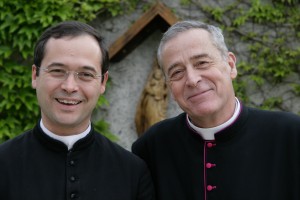The importance of good spirit in the formation
The notion of good spirit that we will try to depict here is a corner stone for those who want to form, grow and develop a community.
For our founder, father Guérin, the category of good or bad spirit was absolutely fundamental. It is clear today that in numerous institutions, schools or even enterprises, it is fashionable to criticize persons or acts, to first of all consider that which doesn’t work well, and most of all to prime one’s individual “self” to the common good. Such a posture is the fruit of at the same time the individualization of the society and of a general discomfort; how can one be surprised by the damage that results? In the same way the authority that guarantees the common good is suspect! The “masters” have difficulties to make themselves heard or respected. Being disciple isn’t anymore a sign of intelligence.
These traits are without doubt a little forced… but we are not far from reality! It suffices to note the place that criticism takes regarding all forms of authority or communitarian entities. Let us add that in this ambient, rather anxiety-provoking climate, one searches securities that one does not find. Hence the many disappointments; and disappointment is, together with fear, the mainspring of this ambient bad spirit. Nothing new. Didn’t Jesus himself invite his disciples to overcome their fears? That is a strong invitation: to have confidence!
The good spirit has a price: Confidence
This is the big secret to the success of all forms of communities. The masters must accept to exercise the authority; the disciples must accept to obey and to be themselves. This might seem simplistic, but it is nevertheless really that which permits the disciples to grow in liberty in a serene climate. They can profit fully of the experience of the seniors and hold their proper place for a better development of the common good. The starting postulate is simple: the community isn’t perfect. Neither the superiors, nor the formation. And nevertheless, the formation is consistent, the older ones seem happy, the superiors seem consistent. The conditions are united in order to preserve and develop the good spirit, that is to say the happiness that comes from the spirit of confidence and liberty.
This good spirit is freely received and maintained when one decides to preserve the peace and the confidence even when one does not understand everything. The good spirit has indeed a price: renounce a part of one’s own good for a much greater good, because there as well one decides to trust the authority that is responsible of the common good. If one considers the place of the authority in this deployment of the good spirit in a community, it is important that those who exercise it know to question themselves and to really listen to all the members of the community. It is fundamental in order that everyone may trust one another. To accept one’s place, to have confidence, believe in the common good, a sense of renouncement, of well-meaning, that it what it takes to cultivate a good spirit in a community.
For me, to talk about the good spirit in a formation is to talk about humility and confidence. If there is something that I have been able to experience during my years in the seminary, it is indeed that we are dwarfs on the shoulders of giants: the good spirit at the seminary demands humility of the young vis-a-vis the experience of the seniors. Accept to be formed, that is to accept oneself to be taught without a priori criticism. It isn’t always easy: it goes fast to make a premature judgment about this or that directive, this or that counsel from a superior or a brother, or even this or that pastoral option chosen by priests in ministry… To accept to begin by saying to oneself “I don’t know” is then an exercise of humility that guarantees the good spirit and the good living in community. But does one have to abandon totally of one’s judgment in order to be “good spirit”? Is exercising one’s spirit of critic in the good sense of the term necessarily synonymous with bad spirit? Of course not, and this is precisely where confidence comes in: to learn to express my view, my opinion, in full liberty, and thereafter obey and consent to the decision of my superiors (even if it is the opposite!) has for me been a school of liberty. This has only been possible with a deep confidence in them, and this is without doubt one of the most beautiful things of my formation!
A seminarian of the 6th year




